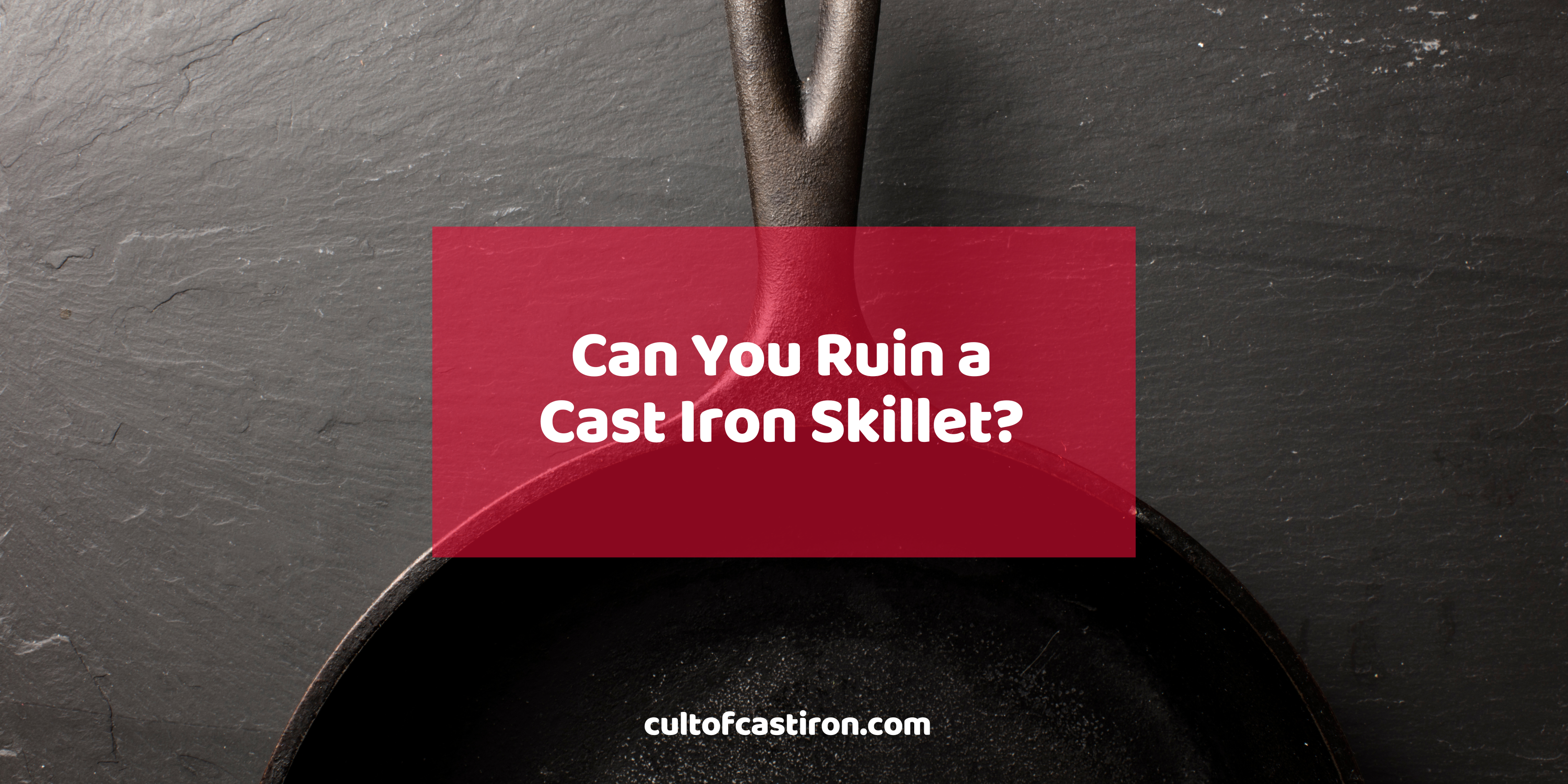Both chefs and home cooks will agree that cast iron skillets are one of the most beloved pieces of cookware. Apart from their versatility and multiple culinary uses, another reason why they’re such a fan-favorite is because of their inherent durability. It will take a lot of effort (or rather neglect) to damage one so you can expect each piece you own to last a lifetime.
While their material and thick construction can make it seem like they’re indestructible, this doesn’t mean that they’re immune from damage. While the ways to completely ruin them are few, it’s essential to be aware of them.
How Can You Ruin a Cast Iron Skillet?
These are the ways you can permanently ruin cast iron skillets. Don’t worry, though, as most of these situations are rare and extreme cases.
Sudden Temperature Shocks
Due to their low thermal conductivity, cast iron skillets take a while to distribute heat evenly across its body. When heated rapidly, different parts of the pan may heat up at different rates. This can cause the hotter parts to expand rapidly from the cooler parts, which can cause cracks along the pan. Conversely, suddenly exposing your hot pan to cold temperatures (e.g. dipping it in cold water immediately after cooking) can also induce damage brought about by thermal shock.
Once a crack appears, you’ll have no choice but to throw out your skillet as it may present hazards such as leaking hot oil all over your kitchen. Moreover, the crack makes it easier for moisture to get inside the core of the pan, making it more prone to rusting. To prevent this, make sure to warm up or cool down your pans gradually.
Exposure to extremely high temperatures
It’s a fact that cast iron pans can withstand high temperatures. But just like any other piece of cookware, it also has its limits. Research on gray cast iron as a material has shown that deformations tend to occur when they’re exposed to a heat range of 500°C – 770°C. Although most ovens and stoves can’t get that hot, campfires can.
Cooking on an open fire can cause warping in some parts of your cast iron skillet. To prevent this, remember this simple outdoor cooking tip: cook with embers, not flames. Embers deliver a more consistent level of heat than the volatile nature of flames. Also, make sure to have a water spray bottle ready to subdue flare-ups caused by fats or juices dripping on embers.
Severe corrosion due to severe neglect
Given that your skillets are made out of iron, it’s important to remember that they can rust. The common culprit for rust would be constant exposure to moisture and oxygen. While encountering rust in cast iron cookware is relatively normal, severe corrosion to the point of developing perforations and thinning of the surface is not normal.
With that said, it takes a while for cast iron cookware to fully degenerate into a useless piece of rusted-out iron. We’re talking about years here if not decades of neglect. Also, it is not unheard-of of people to restore old pieces of cast iron cookware that have been degrading in a barn or a junkyard somewhere.
Be that as it may, regular and proper cast iron seasoning is the key to its longevity.
Breakage due to falling on a hard surface
Cast iron may be hard, but it is also brittle. While dropping your skillet at a high elevation will not put a dent in its surface, it may cause parts to chip, crack, or even break apart. Thankfully, this mostly happens if the skillet was dropped from an extreme height onto a hard surface, and of course, paired with bad luck. Being extra vigilant when handling your skillet will do you well from both a practical and safety standpoint.
Melting Lead and Other Materials
At the end of the day, cast iron skillets were designed for cooking. However, it’s interesting to know that there are some people who use cast iron pans to melt metals. As you guessed, this practice isn’t advisable since it will eventually lead to cookware damage and potential health hazards.
Melting other non-food materials on your cast iron pan, especially lead, can lead to contamination. If you plan to use a cast iron pan for melting metals, make sure to not re-use it for cooking. Purchasing a cast iron melting pot specifically for that end will solve this problem.
What Won’t Ruin Your Cast Iron Pan
Don’t get me wrong, these habits can damage your pan, albeit temporarily. However, these situations are recoverable and won’t cause permanent damage to your pan.
Not taking care of the seasoning
Not seasoning your cast iron pan won’t necessarily cause breakage but it can lead to other issues. Skillets that aren’t seasoned regularly can become rough and prone to rust, giving you a difficult time cooking. If ever your layer of seasoning has deteriorated, you can choose to strip it all away and start anew – just make sure to remove the rust first.
Using soap to clean cast iron skillet
The “no soap on cast iron” rule no longer applies in the modern world. This saying was popular at the turn of the century when harsh lye-based soaps were the norm. Now that dishwashing soaps are milder, they no longer pose a threat to your seasoning, and thus soaps are a welcome addition to your cast iron cleaning arsenal.
Putting cast iron skillet in the dishwasher
Placing your cast iron skillets in the dishwasher won’t necessarily break your pan. But ideally speaking, you shouldn’t be doing this. Dishwashers will expose your pan to high temperatures, moisture, and harsh detergents and this will damage its seasoning or lead to corrosion. However, the worst-case scenario is that you have to strip off your remaining seasoning and start anew.
Cooking fish on a cast iron skillet
Some people have an aversion to cooking fish on their cast iron skillet as it may impart unfavorable smells afterward. While they are not wrong, it is nothing that a little bit of soap (see argument above) and baking soda can’t fix.
Take Care of Your Cookware!
There’s no refuting the fact that cast iron cookware have become staples for kitchens. While they’re strong enough to handle heavy use, they should still be treated as sensitive materials. Setting wear-and-tear aside, there are only a few things that can destroy your cast iron skillets so maintaining them should be a breeze. For all things cast iron, make sure to stay up to date with the Cult of Cast Iron blog!

Miguel is a cast iron enthusiast from Cavite, Philippines. He works in the digital marketing field as a content marketing strategist. On the side, he manages a small online bookstore and tends to his plants.

